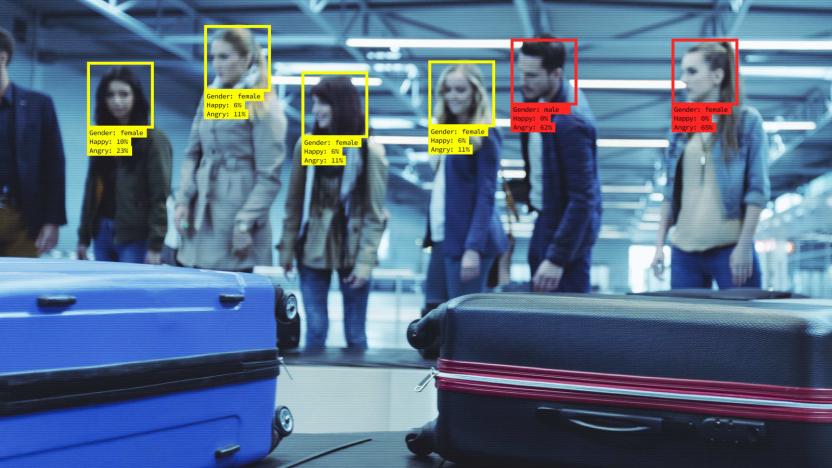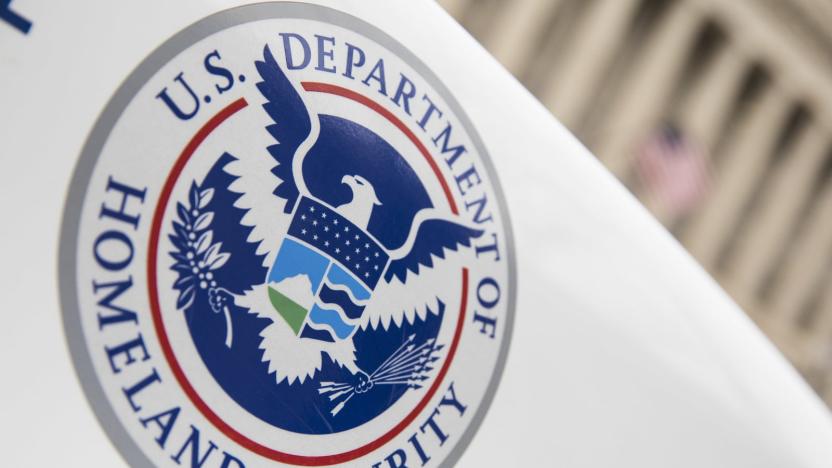foia
Latest

FCC ordered to provide IP addresses tied to fake net neutrality comments
The FCC will have to hand over IP addresses connected to fake net neutrality comments despite claims of privacy violations.

ACLU sues Homeland Security over airport facial recognition records
There's no question that AI surveillance is on the rise, but there are a lot of questions about just how extensively law enforcement agencies, like the Department of Homeland Security (DHS), are using it. In an attempt to increase transparency, the American Civil Liberties Union (ACLU) is suing DHS -- along with Customs and Border Protection (CBP), Immigration and Customs Enforcement (ICE) and the Transportation Security Administration (TSA). The ACLU is requesting records on the use of face surveillance at airports and borders, as well as the agencies' plans for future use.

California sues EPA, NHTSA over data used for car emissions rollback
California has sued the EPA and NHTSA in a bid to get the data used to justify the Trump administration's rollback of vehicle emission standards. State Attorney General Xavier Becerra has accused the agencies of "willfully withholding" the data after they didn't respond to a Freedom of Information Act request for the material used to justify keeping 2020 emissions standards until the 2026 model year instead of raising them under former President Obama's plan.

Dozens of law enforcement agencies are helping ICE track cars
More than 9,200 Immigration and Customs Enforcement employees have access to a license plate database that allows authorities to track the movement of vehicles over time. The American Civil Liberties Union says more than 80 law enforcement agencies across several states are sharing license plate details with ICE, which purportedly doesn't have sufficient safeguards to prevent abuse.

ACLU sues US government over social media surveillance of immigrants
The ACLU has sued the federal government, naming the Department of Justice, the FBI, the Department of Homeland Security, ICE, US Customs and Border Protection, US Citizenship and Immigration Services and the State Department as defendants. The civil rights organization is seeking information regarding the government's practice of monitoring immigrants' and visa applicants' social media accounts, information that it says these agencies have been withholding.

NYT lawsuit accuses FCC of withholding evidence of Russian meddling
Are you frustrated that the FCC has been reluctant to cooperate with investigations into fake anti-net neutrality comments? So is the New York Times. The newspaper has sued the FCC after the regulator repeatedly refused to provide server logs for its public comment system under the Freedom of Information Act, even after the NYT reduced the scale of its requests. Journalists believe the records will "shed light" on the degree to which Russians interfered with both the commenting process and American democracy at large.

White House confirms its chief of staff was hacked
A personal email account of White House Chief of Staff John Kelly was hacked, according to an email obtained by Buzzfeed via a Freedom of Information Act (FOIA) request. "As we discussed ... my folks are nervous about the emails you send and ask that you no longer include them on any postings," Kelly wrote. "Then there is hacking which one of my own personal accounts has suffered recently. I do almost everything now by phone or face-to-face comms."

ACLU sues the TSA for domestic electronics screening details
When the TSA launched stricter screening procedures for domestic passengers' electronic devices last year, it didn't reveal the whys and hows. That didn't sit well with the American Civil Liberties Union Foundation, which has now filed a Freedom of Information Act (FOIA) lawsuit against the organization in an effort to extract more info about its procedures and motivations.

State Department releases emails from Clinton aide Huma Abedin
Like it or not, the Hillary Clinton email saga isn't over yet. The US State Department has released about 2,800 emails and other documents from former Clinton aide Huma Abedin that were found on the laptop of her soon-to-be-former husband Anthony Weiner. The disclosure is a response to a 2015 Freedom of Information Act request from Judicial Watch, a conservative watchdog group that has been hoping to use the presence of classified emails from personal accounts as evidence of lawbreaking by Abedin and Clinton. Most of the messages (covering January 2009 to February 2013) are unclassified, though a handful have been redacted at least in part.

FBI won't be forced to reveal San Bernardino iPhone hacking tool
The Associated Press, USA Today and Vice News have failed in their attempt to reveal the hacking tool the FBI used to access San Bernardino terrorist Syed Farook's iPhone. Judge Tanya Chutkan denied their request in a summary judgment ruling issued late on September 30th, arguing that the risks involved in naming the vendor (and thus the tool) or the price paid are too serious to honor a Freedom of Information Act request. It would make the company a target for retaliatory hacks and exploits that it likely couldn't withstand, Judge Chutkan said, while the price would tell "adversaries" how readily the FBI can use the tool in the future.

Mystery internet company challenges NSA’s mass surveillance order
Thanks to a newly-declassified document, we know that an unnamed tech company refused to comply with NSA orders to let the agency spy on the company's client users. It's the first known case of an organization from the industry outright rejecting such a request.

Trump's quiet war on data begins
Two months into the Trump presidency, there's still a lot of uncertainty surrounding the new administration. One big area of concern is how the executive branch will deal with the vast amounts of data collected by the government. Federal agencies like NASA and EPA conduct countless studies crucial to understanding our impact on climate change. Labor Department surveys are vital to determining the economic health of the country. Will the administration manipulate data that contradicts its political views? Will information become a tool of oppression? Turns out there's a simpler, but potentially just as troublesome possibility: The White House could simply make it disappear.

A version of the pre-Trump EPA website is online
Longing for a time when the White House didn't actively deny the effects humans were having on climate change? You aren't alone. Following the sweeping changes made on Inauguration Day this year, at least three Freedom of Information Act requests were made (per Gizmodo) to bring a pre-Trump-presidency version of the Environmental Protection Agency's website online.

FBI's FOIA website will make it easier to submit requests in March
The FBI's decision to stop accepting email-based Freedom of Information Act (FOIA) requests wouldn't have sounded so bad if the agency didn't present horrible alternatives. Compared to email, snail mailing and faxing requests would take much longer, after all. Plus, the beta version of the eFOIPA submission web portal requires too much personal info and has too many restrictions. Fortunately, the feds seem to have heard the people's complaints and will roll back the portal's worst limitations when it officially opens on March 1st.

By March, the FBI won't let you email in FOIA requests
Formal requests citing the Freedom of Information Act (FOIA) have been a powerful tool in the public's efforts to legally get info from the government. And not just for yourself: Once a FOIA request runs its lengthy course, an official body often releases that intel publicly -- for example, when the CIA published 12 million declassified documents last month on everything from Nazis to UFOs. While they take time to fulfill, most agencies allow citizens to easily submit FOIA inquiries using email, with some notable exceptions relying on older communication methods. But on March 1st, the FBI is intentionally rolling back the technological clock, and will only allow requests via fax or snail mail, plus a limited amount through their online portal.

12 million declassified CIA files are now available online
The CIA has posted a vast cache of nearly 12 million declassified CIA pages online, including info on Nazi war crimes, the Cuban Missile Crisis, UFO sightings, human telepathy ("Project Stargate") and much more. It's been a long time coming -- Bill Clinton first ordered all documents at least 25 years old with "historical value" to be declassified in 1995. The agency complied, but didn't exactly make it easy to see the trove -- you had to trek all the way to the US National Archives in Washington DC to get a peek.

Justice Department sued for old computers slowing FOIA requests
A researcher who specializes in the Freedom of Information Act (FOIA) is suing the Justice Department for using really, really old computers to fulfil requests for information.

NSA spied on your email even after program was shut down
The New York Times is reporting that the NSA developed a way to spy on our emails even after the program allowing it to do so was shut down. Until December 2011, the agency was entitled to bulk-collect emails at will because it was subject to oversight from the intelligence court. That meant that the data had to be used according to the regulations laid down by the Foreign Intelligence Surveillance Act. The NSA, however, had a second, more secretive program, based overseas, that did a similar job, but was under no such legal restriction. As such, when its powers were curtailed, it simply went back to doing what it always did, but in a foreign country.

Report: UK cops request citizen data every two minutes
According to Big Brother Watch (PDF), law enforcement agencies in the United Kingdom have requested the personal metadata of citizens nearly three quarters of a million times in the past two years. That is, between 2012 and 2014, UK cops asked for identifying details pertaining to a text, email, phone call or search some 733,237 times. More than 90 percent of those requests were subsequently granted. That averages out to one fulfilled request every two minutes. Alarmingly, these metadata requests have only increased since 2012 with a whopping 250,000 of them coming last year alone. Even more worrisome, that BBW data originated from a series Freedom of Information Act demands and may under-represent the total number of requests actually made.

DOJ declines to reveal policy memos on GPS tracking
The US Supreme Court might have ruled last year that GPS tracking is equivalent to a search, but that doesn't mean the government's practices are transparent. If anything, they may be more opaque than ever. The Department of Justice has responded to an ACLU Freedom of Information Act request for a pair of GPS tracking policy memos by providing almost completely redacted versions that, effectively, say nothing. Not surprisingly, the ACLU isn't satisfied -- it's worried that the government is playing fast and loose with definitions of where GPS tracking is usable, and when it requires a warrant under the Fourth Amendment. Whether or not the allegations are true, the civil liberty advocates are going through the courts to push for more access; we may know the truth before too long. [Image credit: Frédéric Bisson, Flickr]










